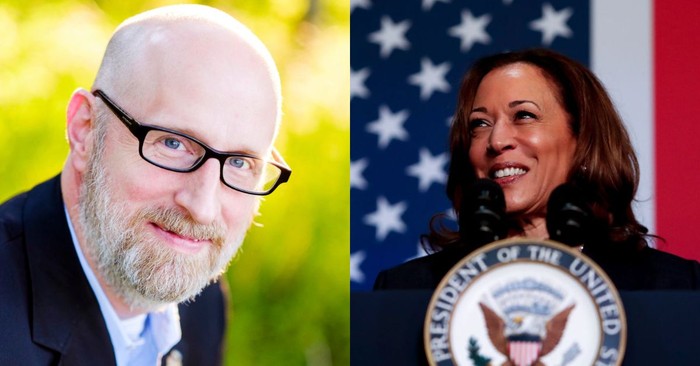Abortion
Why did pro-life David French endorse abortion extremist Kamala Harris?
I wonder if the David French of 2012 would recognize the David French of 2024.
For years, David French was the quintessential National Review writer. He is pro-life, pro-religious liberty, and has an impressive record defending freedom of speech on campuses as an attorney and served honorably in the American military. His prose was rather plodding, but he was difficult to disagree with. Now, he almost exclusively writes columns harshly criticizing evangelicals in publications where they are least likely to make an impact (the New York Times, TIME) on said evangelicals, and he’s voting for Vice President Kamala Harris—the most pro-abortion and radical sexual revolutionary ever to run for America’s highest office.
On August 19, 2024, French penned a column for the Times that carried this title: “David French on the Pro-Life Case for Kamala Harris.” I suspect he gave up attempting to influence American evangelicals quite some time ago, but this column is confirmation. If he wanted to persuade pro-lifers or Christians that voting against Trump is the best way to further the pro-life cause, that’s one thing. Reasonable people can disagree in good faith on the best way to navigate the upcoming presidential election. But to make the case for Harris rather than simply against Trump is to undermine your credibility fatally.
Indeed, Harris is everything Trump is. She lies easily and constantly. She has a similarly sordid sexual past. Her grasp of many complex issues is tenuous at best. Additionally, she genuinely loathes social conservatives and is passionate about abortion. She supports even the most extreme aspects of the LGBT agenda, including sex changes for kids. Harris isn’t hiding these views, either. She’s running on them—and French, who spent years arguing that Christians cannot in good conscience vote for someone devoid of moral character, is now making the case that pro-lifers should vote for an abortion enthusiast.
The strategic and moral bankruptcy of French’s arguments was exposed in a conversation with Ross Douthat (who also writes for the New York Times), in which Douthat—who, like myself, is no fan of Trump—pushed back against French’s premises. Douthat:
Abortion is one of — if not the — centerpieces of the Harris campaign. And at the same time, the pro-life movement, while it has suffered a number of reversals and defeats in referendums since Roe was overturned, is still in a position where 15 or 20 states have substantive and serious restrictions on abortion, something that was not possible under Roe and hasn’t happened for 50 years.
So the pro-life movement is defending real policy territory in a way that wasn’t true in 2016 and 2020. And to me, that combination means that a Harris victory in this election would be a pretty severe defeat for the pro-life side.
The narrative in both parties will be abortion is toxic for Republicans. It’s a winning issue for Democrats. And there will be, I think, a ratchet effect where American politics become substantially more pro-choice in both political parties if Harris wins than it would if she is defeated.
And I’m curious how you see that playing out, because casting a vote for Harris is casting a vote, in my mind, for that near-term substantial defeat for a movement that tries to protect unborn human life.
French responded by noting that prior to Trump, the pro-life movement’s relationship with the GOP was transactional—give us a pro-life agenda, and we’ll give you votes. (I think that’s generally right but, as Marjorie Dannenfelser’s memoir Life is Winning details, it’s more complicated than that.) French:
And I genuinely believe that this is what the pro-life movement’s stance was. You cannot bank on all of these pro-life voters if you’re not a pro-life party. And you’re not going to have all of our loyalty if you’re just the more moderate pro-choice party.
So along comes Donald Trump, who — to say that he has seized the Republican Party is an understatement. He is the Republican Party at this point. Is there any ideology in Republicanism that won’t change if Trump demands that it change?
At this point now, it’s not a party that has a pro-life ethos. It’s a party that has a pro-Donald Trump ethos.
My argument is that you need to fulfill the promise that you’ve made that, no, I’m not going to be Republican. I’m not going to vote for Republicans once it becomes functionally pro-choice. It does not have my loyalty at all. So then the argument becomes, “Well, he’s more moderate.”
French is not the only one making that argument. Some strategists believe that forcing the GOP to pay a price for removing the 1984 pro-life plank from the platform—something I wrote about for First Things at the time—could teach the Republicans an important lesson: You may not be able to win with a 100% pro-life agenda, but you certainly can’t win without pro-life voters, who are a key part of your shrinking coalition. There is logic to this argument. In fact, the pro-life movement has already forced Trump to reverse course at least once—on Florida’s Amendment 4—and he appeared to backtrack on vetoing national abortion legislation at the presidential debate. Trump has no principles to speak of, but he may be susceptible to pressure. Harris is not. That fact matters in any honest discussion about political strategy.
Again, French’s argument here reads as an argument for voting third-party—perhaps the pro-life American Solidarity Party—or writing in a pro-life candidate, not turning around and opting for someone who is positively bloodthirsty in her abortion views. French’s second argument, that pro-lifers should vote for Harris, utterly discredits his first argument and disqualifies him as a strategic voice that pro-lifers should heed. Although, again, I’m not convinced that he’s actually trying to convince anyone at this stage. If he is and he was convinced of the strategic wisdom of endorsing Kamala Harris in the New York Times to genuinely persuade pro-life voters to abandon Trump, that is yet more evidence that his strategic advice should not be taken seriously.
Douthat agreed that Trump has, in a number of ways, pushed America in the pro-choice argument. I buy most of his arguments, which he articulated in a column some time ago. Trump was, in many ways, uniquely unfit to be the figurehead of a movement that seeks to champion both the value and dignity of every human life as well as respect for women. But Douthat still pushed back against French’s argument that a Harris win is preferable:
We’re in the landscape again where lots of states have pro-life, anti-abortion laws. These laws are vulnerable. The pro-life movement is unpopular and likely to lose a lot of referendums. But they are on the books. And it seems to me that an implication of your argument is effectively that the pro-life movement should give up on this election, let Harris win a victory that will be interpreted as a huge and decisive victory for maximalist pro-choice politics. You’re essentially sort of casting all of those laws into the wind and saying: We’re just going to accept that over the next 10 years, they could all go away and we’re starting again at ground zero in terms of winning the war for public opinion.
And maybe that’s necessary. Maybe that’s going to happen anyway, but it’s a pretty big thing to give up for a movement that thinks that thousands and thousands of literal human lives exist right now who would have been killed under an alternative legal system, right?
Indeed. Read the entire debate transcript, which the New York Times published here. Time and again, French makes the case against Trump—but utterly fails to make the case for Harris, especially since much of what he says about Trump also applies to Harris, and then some. To steel man French’s case, he believes that if Trump loses and goes away, his successor is once again likely to be quite pro-life (there are certainly some political pro-life leaders banking on this, as well), and he does not think that a Harris win will be an affirmation of the strength of the pro-choice side of the abortion wars despite the fact that abortion is central to her campaign.
I think Douthat’s analysis is correct that a Harris win would be objectively disastrous for the pro-life movement despite a number of strong pro-life GOP governors cited by French as a firewall against a Harris administration’s radical abortion policies:
And it’s not so much that, you know, tomorrow, Brian Kemp will not stand up in the Georgia legislature and say, “Let’s roll back our abortion restrictions.” But it is that candidates for national office in the Democratic Party will give up on any hint of moderation on the issue and will expect to continue to win on abortion and candidates in the Republican Party will basically say Trump was toxic but he had the right idea by trying to moderate on this issue. That’s what I expect.
French’s case for Kamala Harris got progressively worse throughout the debate—one of the arguments he actually cited in her favor is that she is a person who “came up through law enforcement.” French did not mention that in her capacity as California’s attorney general, she took money from Planned Parenthood, targeted pro-life investigative journalist David Daleiden, had his apartment raided by the feds, and seized his property. That her “law enforcement” career would be mentioned as evidence that she is not an extremist is evidence of just how badly David French has lost the plot.
Again, I sympathize with—and hold—French’s views on Donald Trump the person, although the people he surrounded himself with in his first term resulted in many policy wins. There is also a real case to be made that a Trump loss would be better for social conservatives in the long term—Catholic philosopher Ed Feser lays this out in two very worthwhile pieces, one in The Catholic World Report and the other, titled “Trump: a buyer’s guide,” on his blog. But again, French is not making that case. He is making the case that pro-lifers should cast a vote for the Democratic ticket, which includes a woman who voted against the Born Alive Infant Survivor’s Act and a man who de facto legalized infanticide in Minnesota. This is frankly unconscionable.
David French has spent years rightly noting that the rise of Donald Trump fundamentally changed many people. Many conservatives made political compromises; many rejected their previous view that character truly matters in political leadership. But with his endorsement of Kamala Harris, all of those arguments vanish. He is now planning to vote for someone who believes babies can be killed in the womb throughout all nine months of pregnancy; that abortion survivors should not receive care; that minors should be able to procure sex changes; that the entire LGBT agenda should be implemented at every level. He does not address the real threat of the Democrats rejiggering the entire Supreme Court (which Biden has just endorsed), or any other aspect of Harris’s agenda.
Donald Trump has been the cause of many good people losing their minds. David French may be one of his last victims, but in the end, Trump got him, too.








